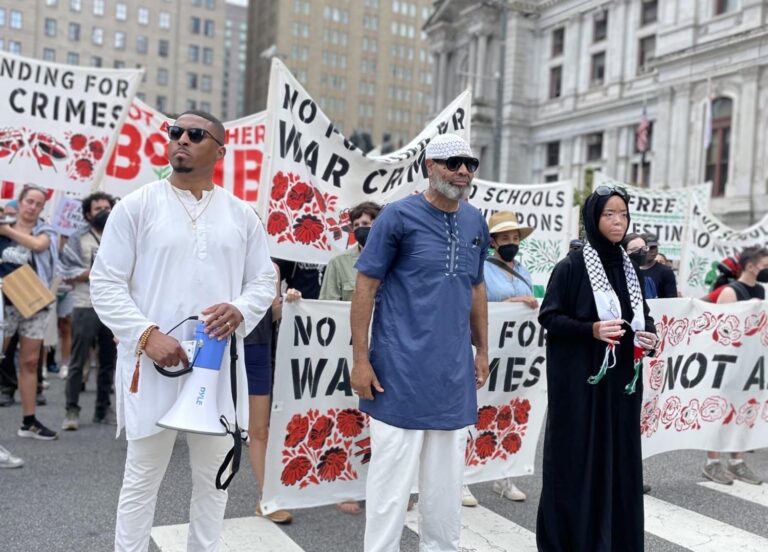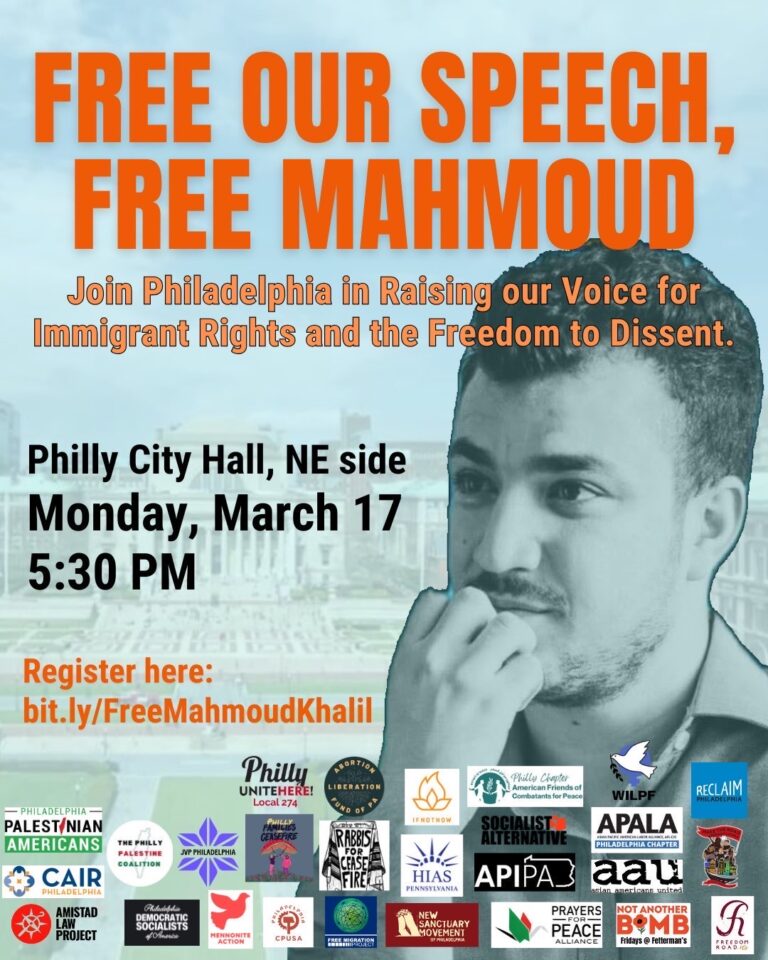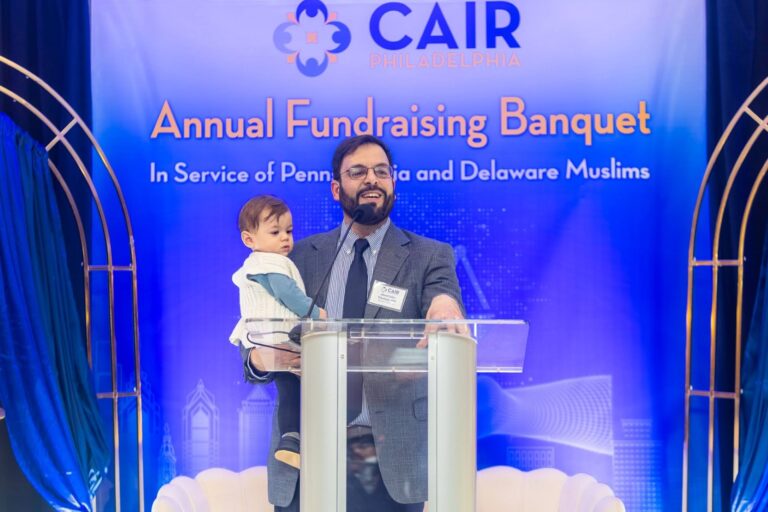
[This past weekend, I had the pleasure of attending an interfaith banquet in Atlanta, Georgia, sponsored by MACE (Muslim American Community Enhancement), a largely African American Muslim organization. I was honored to receive MACE’s “Bridge Builder of the Year Award” in recognition of my interfaith work over the past two decades. Following is the speech I delivered at the event.]
Salam Aleiykulm.
I would like to thank Muslim American Community Enhancement and Imam Muhammad Harrisruddin for this great honor. Being named a “Bridge Builder” is indeed a great tribute, for if we look around the world today, the planent is indeed in need of bridges to span the canyons of ignorance and hatred that separate us from our brothers and sisters. Instead, we build walls between Israel and Palestine, between India and Pakistan, between Mexico and the United States, indoctrinated by the false belief that separation equals security.
But as I stand here today before you, a Jew among Muslims, a white man among African Americans, permit me to expand briefly on the journey that brought me to this moment. My grandparents came to this country at the beginning of the 20th century fleeing the persecution and poverty of the Czar’s Russia. My grandmother was blind in one eye from a bullet fired by mob that rode through their village on Easter, shooting, and burning, and looting, and shouting, “Kill the Jews.” Embarking upon the shores of the New World, with its promise of freedom and opportunity, they found instead the sweatshops and stinking tenements of New York’s Lower Eastside and became involved in the labor struggles to establish an 8-hour day.
It was this same Jewish faith in the obligation to repair a broken world (“Tikkun Ha-Olam” in Hebrew) that led by parents to become active supporters of the African American struggle for civil rights in the 1950s and early 60s. They took me to hear Dr. Martin Luther King preach in the Watts section of Los Angeles in 1962. And I choose Dr. King’s “I have a Dream” speech to deliver to my 8th grade public speaking class, resulting in a group of kids calling me “nigger-lover” later that day on the school yard.
And it was the desire to build bridges that led to my decision in college at UCLA to study the history of religions, specifically how my own faith of Judaism was connected and cross-fertilized by the traditions of Christianity and Islam. It was thus that I first came to know of a time in history known in Arabic as “Al-Andalus”, those centuries in Spain when Muslim rule allow Muslims, and Jews, and Christians to build a culture that the Spanish called “convivencia”, or peaceful coexistence. I fell in love with this time, and visited Spain often, marveling at its mosques and synagogues, and savoring a time when the children of Abraham lived together in peace.
And then came the morning of September 2001, when I was walking in New York’s Central Park near our home with my wife and then infant daughter, and we heard a great noise and lookup to see a jet plane flying low over the trees, its wings wobbling back and forth like this. We rushed home, turned on the TV, and the rest, as they say, is history. In the weeks and months that followed 9/11, we heard many commentators and public intellectuals proclaim that there existed a so-called “clash of civilizations”, in the words of the late Harvard Professor Samuel Huntington, between the Muslim World and the West. This thesis, together with the false claims of Iraq’s “weapons of mass destruction,” became part of the justification for the United States-led invasion of Iraq, and the so-called “war on terror,” a policy that many have argued, including myself, was a grave mistake with disastrous consequences for America and the world.
I felt obligated to respond to this bigotry, this distortion of Islam that was being propagated in the American media, an attempt to portray over a billion Muslims around the world as inherently violet.
As a filmmaker, I therefore began to conceive of a documentary film that would respond both to the terror attacks of Al-Qaeda, as well as to neo-conservative claims of a continuous conflict between the West and the Muslim World. By early 2002, I had decided upon a documentary film that would explore the historical and contemporary influences of the two most illustrious personalities to emerge from medieval Cordoba in Muslim Spain, then the most advanced city on the entire European continent: Rabbi Moses Maimonides, or Musa Ibn Maimun, as he was known in this time. Maimonides had an immeasurable impact upon Jewish culture for centuries to come, in theology, philosophy, law, and medicine. He is widely considered the most influential Jewish thinker of the last millennium.
My second choice was Maimonides’ counterpart, or Averroes the Muslim, his Arabic name being Abu Alwaleed Muhammad ibn Rushd, with the Latinized “Averroes” being the name he was destined to be known in the West. The writings of Ibn Rushd, especially his commentaries on the Greek philosopher Aristotle, when translated into Latin and read in the great Christian universities of Europe, helped to lay the foundation of Western philosophy and led directly to the Renaissance and the Enlightenment.
I called my film “Out of Cordoba”, and it took 10 years to make. But know this, I could not have made this film without the scholarly and financially support that I as a Jew received from Muslims around the world, particularly through my association and friendship with the leadership of ISNA, the Islamic Society of North America. My largest single donation came from Prince Alwaleed bin Talal of Saudi Arabia. And so one morning in 2007, I opened up my email and read: “The Prince ABTF is pleased to announce that we are contributing the amount of $250,000 to your film production ‘Out of Cordoba.’” You don’t receive emails like this every day.
“Out of Cordoba” was finished in 2012, and since then I have screen the film over 130 times at universities, mosques, churches, synagogues, and conferences throughout North America and around the world, including a screening at United Nations Headquarters in New York for over 500 diplomats. The film has won many awards and Aljazeera bought the film and his making an Arabic-language version to broadcast throughout the Middle East.
Yet documentary filmmaking, unlike the Hollywood movie business, is not a particularly lucrative field. And so, after 10 years of making “Out of Cordoba”, and an additional 2 years of presenting it for thousands of people in the US, Europe, and the Middle East, I heard from my two biggest supporters, known as wife and daughter, that it was time for me to get what they referred to as a real job. And it was that search that led me to be hired last October, for which I will be forever grateful, as the Executive Director of the Philadelphia Chapter of CAIR, the Council on American Islamic Relations, the nation’s preeminent Muslim civil rights and advocacy organization.
CAIR, through its legal department and staff attorneys represents Muslims who have faced discrimination in their work places, or bullied in their schools, or harassed or intimidated or profiled or spied upon by police and security agencies of the government of the United States of America. CAIR also works to educate the American public about Islam, to combat the surge of Islamophobia spreading through our land, and to participate in interfaith coalitions that seek to make these United States live up to its promise in the Declaration of Independence, that “all humans are created equal.”
I am CAIR’s first non-Muslim director of one of its 30 chapters around the country, something I feel both great pride and gratitude about. My appointment prompted over 15 interviews with me on local, national, and international TV and radio and in the press, as well as literally over 10,000 separate internet postings and blogs. The great majority of these were positive, but some in my own community called me “traitor” and “self-hating Jew” and “Nazi lover.” This was also because of my decades-long public criticism of Israeli policy towards the Palestinians, and my support of the right of the Palestinians to a free and independent state of their own. As we read in the Holy Qur’an, “You who believe! Be upholders of justice, bearing witness for Allah alone, even against yourselves or your parents and relatives. Whether they are rich or poor, Allah is well able to look after them.” (Surat an-Nisa’, 135)
It is the Muslim community in Philadelphia has welcomed me with open arms, and I often feel I am living a scene out of my movie about Al-Andalus, and like Musa ibn Maymun walking through the gardens of Cordoba eight centuries before me, a Jew among Muslims. Indeed I am blessed.
I would like to close with one of my favorite quotes from the Qur’an:
“To each of you We prescribed a law and a method. Had Allah willed, He would have made you one nation [united in religion], but [He intended] to test you in what He has given you; so race to [all that is] good.” (5:48)





